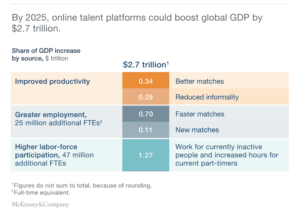The War for Talent Goes Online

The talent shortage is not going away anytime soon.
Earlier this year, PricewaterhouseCoopers reported that 75 percent of more than 1,300 CEOs found it difficult to select people with the skills they needed to grow their businesses. And according to the latest Vistage CEO  Confidence Index, locating, hiring, training, and retaining staff was cited by 35% of all CEOs as their most important task, cited twice as frequently as any other issue.
Confidence Index, locating, hiring, training, and retaining staff was cited by 35% of all CEOs as their most important task, cited twice as frequently as any other issue.
With the old ways of recruiting and hiring no longer getting the job done, top execs are changing their hiring models by increasing their use of contingent workers, part-time employees and outsourcing. In this month’s Pulse of Small Business, Vistage member Pamela Wasley, CEO of Cerius Executives, says bringing in people on a temporary basis to supplement the expertise or bandwidth their current team lacks is a way to quickly meet a company’s needs.
To fill the gaps, CEOs are not only changing the type of worker they’re going after, they’re also looking for a wider mix of skills than in the past and are searching for talent in different geographies, industries or demographic segments. As such, they have to change their way of thinking on how to attract the best talent and where to find it.
“The On-Demand Economy is forcing significant changes in both the staffing and consulting worlds today and, as a result, online talent marketplaces are popping up across the globe. These platforms help companies quickly and easily find the talent they need. In these marketplaces, you’ll find web designers, writers, developers, paralegals as well as part time and temporary executives and high-level consultants. In fact, just about any type of talent can be found now in these marketplaces,” Pamela explains.
According to new research from the McKinsey Global Institute, online talent marketplaces are increasingly becoming the ideal matchmakers for companies and prospective workers of all levels, including executives. The report focuses on the economic growth and employment gains online talent platforms could generate in the decade ahead. 
Their analysis shows that online talent platforms could add $2.7 trillion, or 2 percent, to global GDP by 2025, while increasing employment by 72 million full-time jobs. Along with identifying and recruiting new candidates, companies can use online talent platforms to motivate workers and improve productivity once they start work. McKinsey calculated that these platforms could increase company output by up to 9 percent and reduce the cost of recruiting by as much as 7 percent.
“With 83% of companies now using a mixed workforce of part time, temporary, seasonal or full time employees and consultants, it is even more important that they have a better, faster way to find the best talent no matter where it is; thus the importance of these online talent marketplaces. And by putting the right type of person into the right role, you not only increase productivity but also lower your labor costs,” says Pamela Wasley.
For more on the opportunities, challenges and questions facing CEOs as they look to deepen investment in talent and other areas, check out the full interview with Pamela in this month’s Pulse of Small Business.
Category: Talent Management
Tags: recruiting, Vistage International

